Understanding the Costs of Parrot Ownership
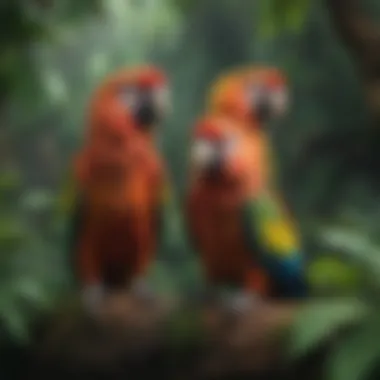
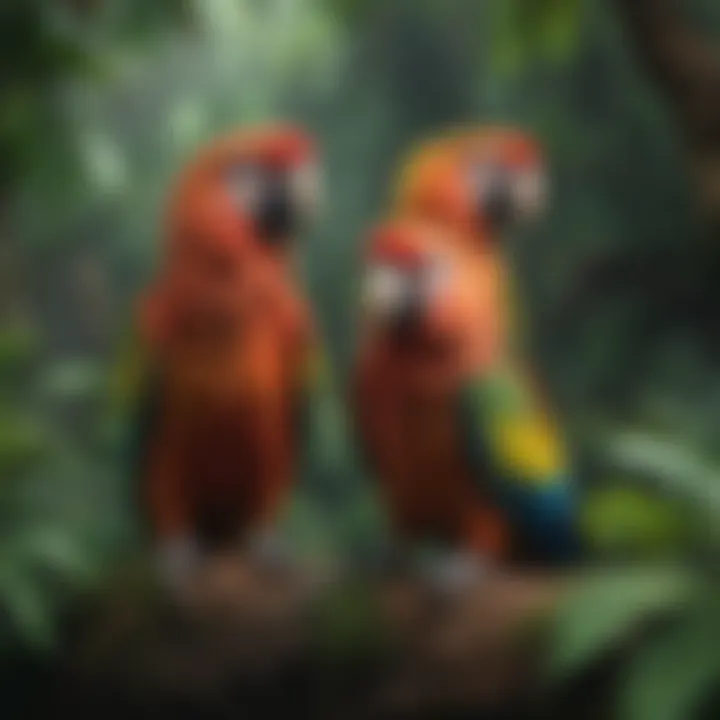
Intro
Owning a parrot can be a truly rewarding experience, yet it comes with its own set of challenges and obligations that go beyond merely enjoying the company of these vibrant creatures. Understanding the myriad costs involved—both financial and emotional—helps ensure you are prepared for the responsibility that lies ahead. This guide will peel back the layers of parrot ownership, looking closely at the day-to-day needs of these birds and the commitment entailed in nurturing them, both for their sake and for yours.
Avian Care Basics
To kick off our exploration, it's crucial to touch on the foundational aspects of avian care. Without proper knowledge in these areas, a well-meaning owner can easily find themselves in over their heads.
Importance of Proper Nutrition
Feeding your parrot a balanced diet is the bedrock of its health. Each parrot species has unique dietary requirements, generally revolving around seeds, pellets, fruits, and vegetables. For instance, African Greys thrive on a diet high in fresh veggies and specialized pellets. Conversely, Cockatiels may munch on seeds but also require greens to round out their nutrition. Neglecting these specifics can lead to severe health issues, so it’s essential to do diligent research on the dietary needs pertinent to your feathered friend.
Understanding Bird Species and Their Needs
Recognizing the different requirements for each bird species goes hand in hand with nutrition. A macaw will demand much more interactive play and larger living space than a budgie, who is generally more self-sufficient. Think of it as choosing a companion that matches your lifestyle: If you enjoy a lively atmosphere, a chatty parrot like a Quaker may fit the bill. However, if you prefer a calmer presence, a Lovebird may be just the ticket.
Basics of Birds Habitat Setup
When setting up a habitat, consider both spaciousness and enriching components. The cage should be large enough for flying, and it must be equipped with perches, toys, and safe hiding places. Before long, you'll collect an assortment of fun items that your bird will enjoy, but make sure each item is safe and free from harmful materials.
Grooming and Hygiene Tips
Keeping your parrot well-groomed is a vital part of ownership. Regular nail trimming and beak maintenance help prevent discomfort and health problems in the long run. Additionally, providing opportunities for baths—whether through misting, a small bath bowl, or just a gentle rinse in the shower—can keep your bird happy and clean.
"A clean bird is a happy bird, and a happy bird is a healthy bird."
Interacting with Your Pet Bird
Connecting with your parrot goes beyond basic care. Knowing how to communicate and build a lasting bond can turn your relationship from mere ownership into a true companionship.
Building Trust and Connection
The foundation of interaction lies in trust. Taking the time to familiarize your bird with your voice and presence can help solidify this trust. Speak softly, offer treats, and let them initiate contact. Remember that patience pays off; some birds may take longer to warm up.
Training Techniques and Tips
Positive reinforcement techniques can yield fantastic results when training your parrot. Using small amounts of fruit or seed as rewards can encourage desired behaviors. Basic commands like “step up” or “down” can greatly benefit both owners and birds. Training isn’t just practical; it strengthens your bond and keeps your parrot mentally stimulated.
Fun Activities for Bird Owners and Their Birds
Engaging your parrot in playful activities can ramp up its emotional and mental well-being. Toys that encourage foraging, puzzle feeders, and even simple games can foster a stimulating environment. Remember to switch up their toys and games every so often to keep things fresh and engaging for them.
Recognizing Bird Cues and Behaviors
Being in tune with your parrot’s body language is essential. A parrot that puffs up or moves away may be feeling stressed, while one that vocalizes frequently could either be bored or just happy to engage. Learning these subtle cues can prevent misunderstandings and promote a harmonious relationship.
Emotional Well-Being of Birds
Parrots are social creatures, and their emotional health should never be overlooked. Creating an environment that supports play and social interaction can significantly impact their well-being.
The Role of Play and Socialization
Providing meaningful social interaction is paramount. Parrots thrive on companionship, whether that be from their human caregivers or other birds. Spend time with your parrot, talk to it, and let it out of its cage for play. These small gestures can lead to a happier, healthier bird.
Enhancing Birds' Emotional Health
Consider setting up a routine that includes time for play, foraging activities, and mental challenges to keep your parrot engaged. Enrichment can come in various forms—train them new tricks or introduce new, safe toys to their environment.
Assessing Bird Stress and Remedies
Monitoring stress levels in your parrot is crucial. Changes in vocalization, appearance, or behavior might indicate discomfort. A calm environment, proper socialization, and regular check-ups can help mitigate stressors.
Building Strong Human-Bird Bonds
Finally, consistency and understanding play critical roles in fostering robust human-bird bonds. Aim to create a nurturing environment where your parrot feels secure, which will lead to trust and companionship over time.
Bird Health and Safety
A healthy parrot is a happy parrot. Keeping tabs on health and safety is fundamental to prolonged companionship.
Common Health Issues and Prevention
Parrots face various health concerns, such as respiratory infections, obesity, and feather plucking. Regularly check your bird for signs of distress or illness, and ensure they have a balanced diet and exercise to prevent these issues.
Routine Veterinary Care
Absolutely schedule routine visits to an avian vet. They'll perform necessary check-ups and recommend vaccinations if needed. This may feel like an added expense, but it's essential for your bird's health.
Environmental Hazards to Avoid
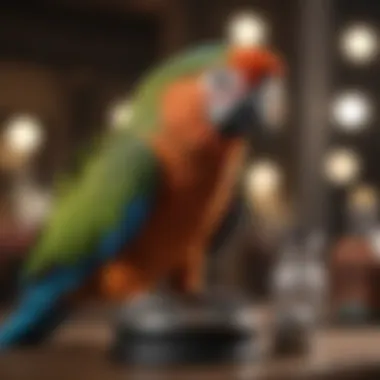
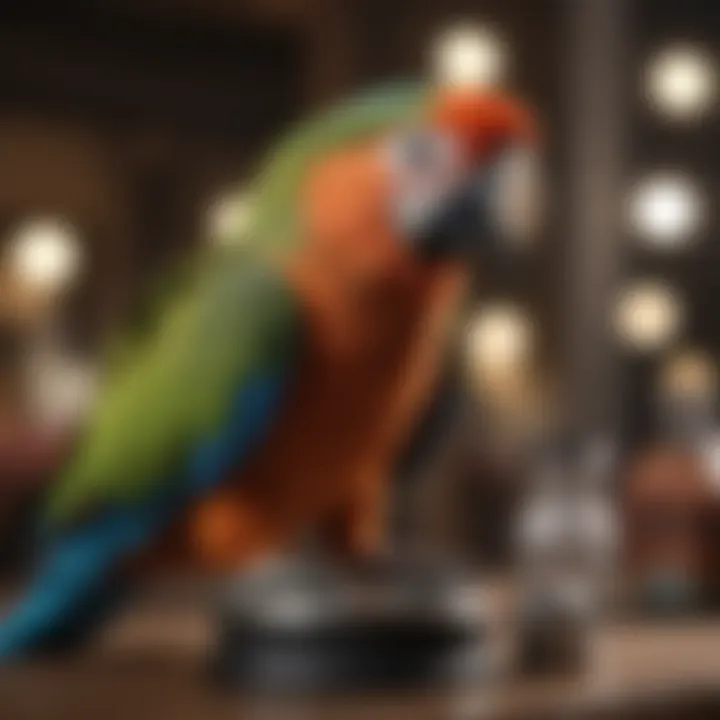
Your home environment can pose risk factors. Common household items like certain plants, toxic foods, and even strong fragrances can harm birds. Research and remove any identified hazards to create a safe haven for your feathered friend.
Signs of Illness or Distress
Lastly, familiarize yourself with signs of illness, such as changes in appetite, lethargy, or strange vocalizations. Early detection can be a life-saver and can help you understand your bird better, leading to improved care.
Fun Facts and Quirky Insights
As a curious bird owner, you might enjoy knowing some fascinating tidbits about our charming feathered friends.
Unique Traits of Popular Bird Species
Various parrot species boast remarkable traits. For example, African Greys are known for their impressive vocabulary, while Lovebirds exhibit a strong bonding behavior.
Historical and Cultural Significance of Birds
Birds have held a significant role in many cultures throughout history. From ancient Egypt to indigenous tribes, these avian creatures symbolize everything from freedom to love.
Famous Bird Owners and Their Stories
Even celebrities share a fondness for these colorful companions. For instance, Mike Tyson had a pet African Grey named "Darcy" that he often flaunted in media appearances. Their relationships often bring a unique charm that transcends the ordinary pet-owner dynamic.
Prolusion to Parrot Ownership
Parrots are not merely beautiful birds; they are complex creatures requiring significant dedication and care. Understanding their needs is fundamental for anyone considering parrot ownership. This section sets the stage for what’s to come, highlighting the key aspects of having a parrot as a pet.
Overview of Parrots as Pets
Parrots are known for their striking plumage and engaging personalities. With a variety of species to choose from, potential owners often find themselves mesmerized by these birds. From the friendly Budgerigar to the intelligent African Grey, each species offers unique charms. Parrots are social and require ample interaction; they thrive on companionship, making them quite different from traditional pets like dogs or cats.
However, it is essential to realize that owning a parrot brings along responsibilities. Like any living being, they need proper nutrition and mental stimulation. Owners must be ready to invest the time and effort needed to keep their feathered friends happy and healthy. Parrots communicate not only through vocalizations but also through body language, and understanding these nuances is key to building a strong bond.
Parrot Popularity in Households
In recent years, the trend of bird ownership has experienced a noticeable uplift. Parrots, in particular, have become a popular choice among pet enthusiasts. Their vibrant personalities shine through, making them delightful members of the family. According to various surveys, many households view parrots as more than just pets; they are seen as companions that provide emotional support.
- Why Parrots?
- Intelligent and social creatures
- Long lifespan, often spanning decades
- Ability to mimic human speech, engaging their human companions
However, their growing popularity raises pertinent points about responsibility. Many people jump into ownership with little understanding of what it involves, sometimes leading to unfortunate situations where birds are rehomed. Just because something’s trendy or looks delightful doesn’t mean one is ready to handle the realities of caring for a parrot. Responsible ownership means being prepared for the long haul — both in love and care.
"Owning a parrot is not just about enjoying their beauty; it’s about nurturing a relationship built on trust and understanding."
In summary, before taking the plunge into parrot ownership, it is crucial to weigh both the benefits and challenges. Being informed lays the groundwork for a fulfilling experience, ensuring both the pet and owner thrive in harmony.
Initial Financial Commitments
When considering bringing a parrot into your life, understanding the initial financial commitments is key. These costs aren't simply transactional; rather, they lay the groundwork for a rewarding and long-lived companionship. One must weigh the financial outlay against the benefits of having a vibrant creature that has the potential to enhance your environment and emotional wellbeing. The expenses can vary significantly based on a variety of factors, including the parrot's species, where you acquire it, and the essential items needed for their wellbeing.
Acquisition Costs
Types of Parrots
The parrot species you decide on has a great impact on your initial costs. Popular choices include African Grey, Amazon, and budgerigars. African Greys, while captivating with their intelligence and sociability, can come with hefty price tags, sometimes ranging in the thousands. On the other hand, budgerigars tend to be more affordable and often range between $20 to $100.
Each species comes with its unique traits and behaviors which might influence your final choice. For example, larger parrots like macaws require larger living spaces and specialized diets, which can rack up expenses quickly. The diversity among species means potential owners must align their financial capability with the specific needs of the parrot they wish to adopt.
Breeder vs. Rescue Costs
The decision of whether to acquire a parrot from a breeder or a rescue organization plays a significant role in your initial financial commitment. Breeders typically charge more due to their investments in breeding programs and the quality of their birds. You might end up paying anywhere between a few hundred to several thousand dollars for a parrot from a reputable breeder. These birds often come with valuable information about their lineage and health history, which can be reassuring for new owners.
Conversely, rescue birds come with their own set of benefits and challenges. Adoption fees at these organizations are generally lower, often ranging from $50 to $250, and each adoption typically includes initial health checks. However, the history of these birds can sometimes be less transparent, and if they require rehabilitation or extra care, costs can escalate unexpectedly.
Basic Equipment Needs
Your financial commitment doesn’t end with acquiring your feathered friend. Basic equipment is essential for the quality of life your parrot will experience within your home.
Cages and Enclosures
The cage is perhaps the most significant one-time purchase you'll face. A high-quality cage can cost between $150 to $1,000, depending on size and material. A spacious, sturdy enclosure is crucial as it cultivates a safe environment for your parrot when it is not interacting with you.
Cheaper options may seem tempting, but they often sacrifice durability and safety, which could lead to dangerous situations for your bird. It's also vital to account for location as larger birds require larger cages to accommodate their need for flight and play. Investing in a solid, comfortable cage will indeed pay off in the long run.
Toys and Enrichment
Toys and enrichment materials significantly contribute to a parrot’s emotional health. They require stimulation and variety to thrive. You can expect to spend anywhere from $5 to $50 per toy, depending on the complexity and durability. Parrots are active creatures; they need appropriate outlets for their energy, and stimulating toys can help prevent behavioral issues arising from boredom.
Building a collection of items won’t just make your parrot’s life more enriching but can also foster strong interaction between the two of you.
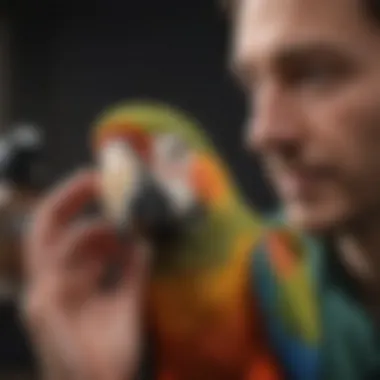
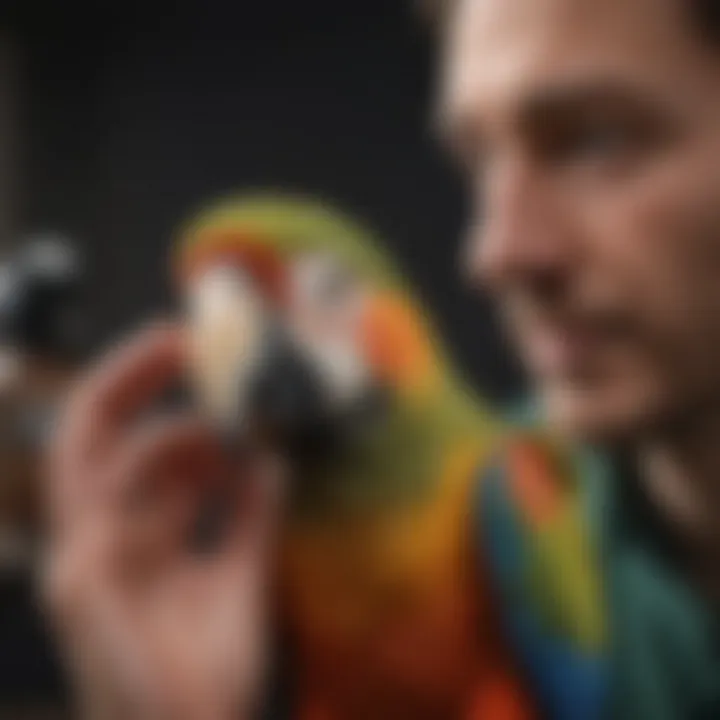
To summarize, understanding these initial financial commitments equips prospective parrot owners with the knowledge needed to embark on their journey responsibly. The upfront costs, whether it's acquiring a bird, getting comprehensive care, or setting up a suitable home, shape the experience ahead.
Ongoing Care Expenses
When considering the commitment of owning a parrot, it's crucial to be aware of the ongoing care expenses associated with this vibrant companion. Unlike cats or dogs, parrots have unique dietary and medical needs that can lead to significant recurring costs. Understanding these expenses can help prospective owners prepare for the realities of parrot ownership, ensuring they provide a proper environment that fosters health and happiness.
Diet and Nutrition
Cost of Quality Pellets
One of the most significant aspects of a parrot’s diet is the quality of pellets offered. Choosing premium pellets often leads to long-term health benefits for your feathered friend. Quality pellets are specifically formulated with essential vitamins, minerals, and proteins that support the overall well-being of parrots. While they may cost a bit more than store brands, investing in these high-quality food sources can ward off health issues related to poor nutrition.
The unique feature of these pellets lies in their balanced formulation. Unlike generic ones that may lack certain nutrients, quality pellets can help prevent common ailments and ensure vibrant plumage. After all, feeding your parrot right can save you from considerable vet bills in the future.
Fresh Foods and Treats
Beyond pellets, incorporating fresh foods and treats into your parrot's diet plays a vital role. Fresh fruits and vegetables are not only a great source of hydration but also offer essential nutrients. Many parrot owners find that fresh produce keeps their birds more engaged and less prone to behavioral issues.
However, this comes with its own cost. Seasonal produce can vary in price, and buying organic options often involves higher expenditures. Despite the potential ups and downs in pricing, fresh foods are a beloved choice among avian experts as they promote a healthier, happier bird. Their unique feature lies in offering not just nourishment, but also a chance for enrichment through varied textures and flavors.
Routine Veterinary Care
Annual Check-ups
Annual check-ups are crucial for monitoring a parrot’s health. Just like a yearly physical for humans, these vets’ visits can catch potential health problems before they escalate. Many owners often overlook this expense, but an annual check can save a fortune down the line. The typical vet visit might run around $50 to $150, depending on the services included, making it a relatively minor investment for peace of mind.
The key characteristic here is preventative care. A simple examination can reveal underlying issues such as respiratory problems or feather plucking before they require complex treatments. Failing to invest in regular check-ups could lead to unexpected spikes in medical costs when a problem worsens unnoticed.
Emergency Care Costs
Sadly, emergencies can and do arise, and they often come with a hefty price tag. Emergency care for parrots can be unpredictable and varies widely in cost depending on the nature of the injury or illness. Sometimes it may lead to spending hundreds or even thousands of dollars if surgery or intensive treatment is necessary.
While no one likes to think about such scenarios, having a financial cushion for emergencies is essential. This aspect signals the importance of being prepared for sudden expenses, as they can arise from seemingly minor situations that quickly escalate, like accidental injuries. So one needs to stay prepared for the worst; it’s part of the responsibility of caring for these lively birds.
Insurance and Unexpected Costs
Pet Insurance Considerations
Pet insurance can be daunting for parrot owners, but looking into it might save a considerable amount of money in the long run. It serves not only as a financial safety net for unexpected vet costs but also provides peace of mind when unexpected health issues arise.
Different plans cater to the specific needs of birds and often cover routine exams, emergencies, and sometimes even behavioral consultations. The key feature of pet insurance is that it helps manage costs, allowing individuals to focus on providing care rather than stressing about finances.
Nevertheless, potential owners should read the fine print closely; not all insurance policies cover avian-specific treatments, and premiums can vary significantly based on coverage level.
Hidden Expenses
Hidden costs are often pesky little surprises that catch new owners off-guard. These can include things like habitat upgrades, extra toys for mental stimulation, or costly cleaning supplies. Sometimes little things like avian-safe cleaning products or specialized lighting come into play.
The key characteristic of these hidden expenses is their unexpected nature. They can range from $10 to hundreds, making them difficult to predict accurately. Being aware of the potential for these costs can help owners budget better and avoid feeling overwhelmed down the line.
Understanding the ongoing care expenses related to parrot ownership not only prepares potential owners for the financial responsibilities but also helps ensure that they’re ready to provide a supportive and loving environment for their cherished companion.
Being knowledgeable about these aspects can cultivate a meaningful relationship and an enriching life for both pet and owner.
Time and Emotional Investment
When it comes to parrot ownership, evaluating time and emotional investment is crucial. Contrary to some beliefs, bringing a parrot into your life isn't just about feeding and offering a cage. These creatures are intelligent and social beings that thrive on interaction. Without proper engagement, they can become anxious and depressed. Potential owners must consider whether they can commit to nurturing both the mental and emotional needs of these vibrant companions.
Daily Interaction Requirements
Socialization Needs
Socialization is an essential pillar in the life of a parrot. Parrots are inherently social animals that require interaction to feel secure and establish bonds with their human caregivers. Regularly spending time with a parrot helps them develop trust and reduces behavioral issues such as feather plucking or excessive squawking. A parrot that lacks social interaction may see its owner as a mere provider of food and water, rather than a companion.
In this context, a key characteristic of socialization is its role in fostering relationships. Although some owners might think they can simply leave the parrot with toys and food, this neglect can lead to loneliness and stress for the bird. An owner who understands the importance of social engagement will find that a well-socialized parrot is often more well-adjusted and enjoyable to be around.
In the larger topic of parrot ownership, socialization is beneficial because it not only improves the parrot's well-being but also enhances the owner's experience. However, consistent effort must be made. For instance, one could spend 1-2 hours a day engaging in playtime, training, or simply talking to their feathered friend. The downside might be that this commitment can feel overwhelming at times, especially for those who lead busy lives.
Mental Stimulation
Mental stimulation is another critical aspect that cannot be overlooked if one is to ensure a happy parrot. These birds have remarkable intelligence and need challenges to keep their minds sharp. Boredom can easily set in, leading to destructive behavior. Owners must provide various activities that encourage exploration and learning, such as puzzles, foraging toys, or even simple rearranging of their cage environment.
The importance of mental stimulation lies in its capacity to replicate the bird's natural habitat where it would typically forage and explore. Parrots that receive adequate mental engagement through toys or training are less prone to feel confined, significantly boosting their mood and interaction levels with their owners. A unique feature of mental stimulation is that it can make training more effective, as a mentally stimulated parrot is more likely to be receptive and engaged.
Yet, this comes with the challenge of needing to regularly update the challenges presented to your parrot. Using the same toy or the same training regimen can lead a parrot to lose interest. Thus, owners need a plan to rotate new toys or activities frequently, which may require planning and additional financial investment.
Bonding and Training
Time Allocated for Training
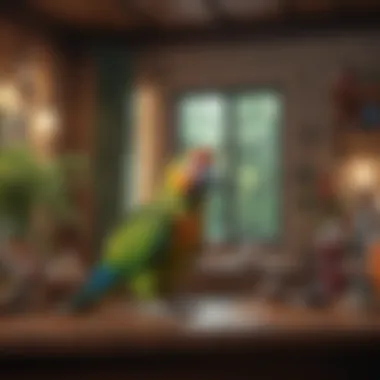
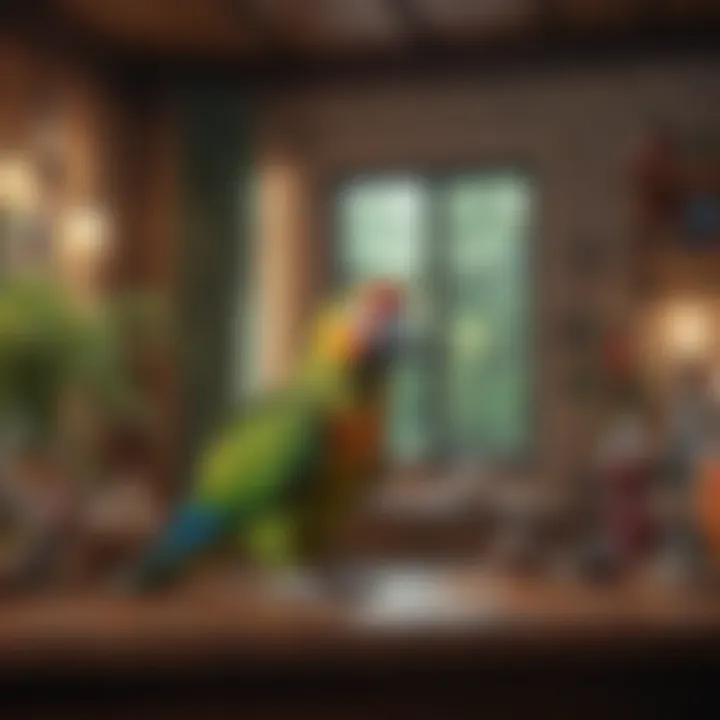
The time you invest in training your parrot can significantly affect both your life's quality and the bird's behavior. Training improves communication and helps avoid potential behavioral problems down the road. Many parrot owners overestimate how quickly their birds can learn but fail to recognize that training sessions should be consistent, even if they are short. Ideally, you should allocate around 15-20 minutes a day to practice commands or tricks with your parrot.
The key here is that effective training goes beyond just teaching tricks; it's about establishing communication. Parrots respond well to positive reinforcement, and spending time reinforcing good behavior fosters a culture of trust and engagement. As a result, many owners find that the investment made in training reaps long-term benefits, reducing the likelihood of issues related to behavioral problems.
However, the downside is that training can require patience and sometimes can be frustrating. Not every bird learns the same way or at the same speed. In this regard, the unique feature of training is also its time-consuming nature, which demands consistent effort from the owner and a willingness to adapt to the bird's learning curve.
Understanding Parrot Behavior
Understanding parrot behavior is equally important in fostering a long-lasting and healthy relationship. Knowledge of the bird's natural instincts, body language, and vocalizations can significantly enhance the owner's ability to respond effectively. Observing your parrot’s behavior can uncover subtle signs of happiness or distress, thereby enabling timely and appropriate interventions.
The extraordinarily dynamic nature of parrot behavior makes this aspect particularly fascinating. Parrots express their feelings through a variety of behaviors and vocalizations. By dedicating time to understand these cues, an owner can enrich the relationship they have with their parrot. A parrot that feels understood is generally more content and willing to interact.
However, gaining this understanding requires time and effort to observe and learn. Owners must be engaged daily to truly grasp their parrot’s behavioral language. Sometimes, there is a learning curve, particularly for new owners. But once established, this understanding enhances the social bond and mitigates misunderstandings, fostering a healthier relationship overall.
Impact on Lifestyle
Travel Constraints
Traveling can become a significant limitation for parrot owners. These birds can experience stress when placed in new environments or when their routines are disrupted. Therefore, it's essential to consider the impact of travel on your ability to provide consistent care. Some owners find that their plans to travel are curtailed or adjusted to accommodate their parrot's needs.
This is particularly relevant when seeking care for the bird during the owner's absence. Finding someone who understands parrot care isn't always easy. The increased consideration and the necessary adjustments due to travel can become a restricting factor in one’s lifestyle. While most pet owners can count on family or friends for pet-sitting, birds are different and often require specialized care.
Consequently, it's important to have a contingency plan, whether that's finding a capable pet-sitter or arranging a boarding facility that specializes in avian care. The downside is that accommodating these constraints can sometimes lead to missed opportunities or expenses for owners.
Social Life Adjustments
Similar to travel constraints, social life adjustments are something every parrot owner faces. The need for socialization and the demand that parrots have for interaction may require owners to reassess their social lives. Gatherings that might be simple for a dog owner could become a bit more complicated for someone with a parrot. Some might even find it challenging to invite friends over due to the unique needs of their birds.
The key characteristic of these adjustments is the inherent sense of responsibility that parrot ownership requires. Parrots, much like toddlers, thrive best when their environment is stable, and their emotional needs are regularly met. Therefore, aspects such as late-night soirées or spontaneous trips could clash with an owners’ responsibilities to their parrot.
However, the beauty of these adjustments is that they often lead to deeper relationships and understanding among friends and family who come to appreciate the commitment involved with parrot care. While social dynamics may shift, they often allow for the development of a supportive network of pet-loving friends.
In the grand scheme of things, time and emotional investment in parrot ownership is not merely a set of requirements. It’s an investment that, when approached with thoughtfulness, ultimately leads to a rich and fulfilling relationship with a remarkable companion.
While the obligations may seem daunting, they pave the way for a unique bond that is uniquely reciprocating and rewarding.
Long-Term Commitment and Responsibility
Owning a parrot is nothing short of a long-term relationship, often spanning several decades. This commitment goes beyond financial costs; it taps deeply into emotional involvement, daily routines, and life choices. Parrots require not just food and shelter but also love, attention, and social interaction. This makes understanding the long-term responsibility essential for anyone considering welcoming these beautiful creatures into their homes.
Lifespan of Parrots
General Lifespan Expectations
Most species of parrots have impressively long lifespans, ranging from 20 years for smaller breeds, like budgerigars, to over 50 years for larger ones, such as macaws. This longevity is remarkable, as it allows for deep bonds to form between parrots and their owners. However, this high lifespan can also lead to unexpected challenges. If a person accounts only for the initial purchase and care costs, they may find themselves ill-prepared for the many years of responsibility that follows. Therefore, the general lifespan expectation is a double-edged sword. It can be immensely rewarding, but it also requires a long-term investment of time and resources to meet the needs of a long-living companion.
Impact on Family and Career
Having a parrot shifts the dynamics at home and can influence career decisions. The time commitment required to care for a parrot can mean less flexibility in one’s work schedule. For instance, a parrot with a lifespan of 30 to 50 years is not just a short-term commitment but can affect family planning and career goals. Potential owners must carefully contemplate how a parrot fits into daily life and future ambitions. This can lead to difficult choices between personal aspirations and the unwavering obligation to a pet that depends on its humans. The impact of parrot ownership is profound and can create both enriching experiences and considerable sacrifices.
Legacy and Rehoming Considerations
Planning for Long-Term Care
Planning for long-term care involves thinking ahead, often years in advance. Owners should consider who will look after their parrot if they are unable due to health issues or other life changes. This means making arrangements with trusted friends or family, or even a bird sanctuary, should the need arise. By proactively planning, one can ensure that the parrot’s needs continue to be met, promoting a sense of security and responsibility in the ownership journey. However, the unique feature of this planning might weigh on the emotional well-being of a pet owner, leading to discussions that many would prefer to avoid.
Options for Rehoming
When circumstances change, the route of rehoming might become necessary. Understanding the options available for rehoming is crucial. There are numerous resources where owners can find alternatives, such as local bird clubs or shelters with a focus on avian care. While it can be challenging to consider rehoming, doing so responsibly can ensure the well-being of the parrot. Various online platforms like Reddit and Facebook have groups dedicated to helping. However, rehoming can carry emotional strain, adding yet another layer of complexity to parrot ownership.
Ultimately, the long-term commitment of parrot ownership is not just about the years spent together but the continuous effort to ensure a happy and healthy life for these incredible creatures.
The End
When it comes to bringing a parrot into your home, the journey must hinge on thorough preparation and a clear understanding of what’s involved. The overall theme of all we've discussed is not just about numbers — it’s about the commitment that transcends mere financial outlays. This section wraps up the crux of parrot ownership, juxtaposing the many layers of responsibility that aspiring bird parents take on.
Assessing Your Readiness for Parrot Ownership
Financial Preparedness
Delving into financial preparedness gives a good glimpse into what you should reckon with when considering a parrot. This aspect signifies more than just having the cash handy; it’s about having a budget that can sustain the ever-evolving needs of your feathered friend. You'll not only need to consider the initial acquisition costs but also the ongoing expenses. Thinking long-term helps paint a clearer picture of whether you’re truly prepared. Many parrot owners discover that unexpected costs crop up — be it from specialty diets, emergency vet visits, or even the need for enrichment toys. It can be quite the wake-up call to realize that budgeting for a parrot is a constant task, almost akin to budgeting for a small child.
So why is sound financial preparedness considered beneficial? Think of it as a cushion that absorbs shocks of unexpected expenses. A strong budget won't just allow you to keep your parrot happy but ensures you can maintain a stable home environment where both you and your pet can thrive. Without a proper financial appraisal, your well-meaning intentions might just fall to the wayside when faced with unplanned bills or economic strains.
Emotional and Time Commitments
Equally critical is the emotional and time commitment involved in such a relationship. Parrots aren't just pets; they are intelligent beings that demand interaction, socialization, and mental stimulation. They require a daily routine, which at times can feel like juggling flaming torches. The unique feature here is the emotional support you both offer to each other — your parrot might be a friend who uplifts your mood or offers a comforting presence through good and bad times.
However, this commitment has its downside. Jumping into parrot ownership without recognizing the hours of social and emotional effort can lead to problems like boredom or anxiety for the bird, which isn’t healthy for anyone involved. It's not merely a case of feeding and cleaning; it's a time investment that can rearrange your daily life. Understand that your social life may need to shift, and decisions about travel or spontaneous outings must reflect your bird's needs.
Final Thoughts on Responsible Pet Ownership
In concluding the discussions on parrot ownership, it’s evident that understanding the massive responsibility involved is paramount. While the allure of colorful feathers and charming antics can draw individuals in, the glue that holds this endeavor together is a solid foundation of knowledge and insight.
Ultimately, responsible pet ownership encompasses a holistic approach to care, encompassing financial, emotional, and social obligations. Responsible ownership not only enhances the experience for you and your parrot but also reflects in the well-being of the bird itself.
All things considered, being a parrot owner goes beyond just filling a void or finding a lively companion; it is about entering a partnership that demands attention and effort on multiple fronts. Embrace this role fully, and your future with a parrot can be a rewarding journey that enriches both your life and the life of your avian friend.















